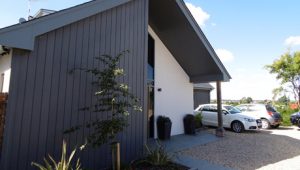Research Shows Self-Builders Are Far Ahead Of The Sustainability Curve
December 16, 2021Recent research from the Community Land Trust shows that Britain’s self-builders are embracing the highest sustainability goals, with their green ambitions outstripping legal and regulatory requirements.*
The research, Leading to Net Zero, published to coincide with the COP26 summit, was based on plans for community-led and self-build housing projects across the UK. It demonstrated that these projects would create more sustainable homes than the average minimum energy standards for the UK, far beyond minimum regulatory standards. Many self-builders are building their “forever homes” and, with profit not the motivating factor, many plan to stay in their homes for far longer than those buying a standard new build.

One of the quickest wins for self-builders is the selection of building materials. Choosing recycled and recyclable materials like aluminium reduces the building’s embedded (or embodied) carbon. And by reducing ongoing maintenance and eliminating frequent refurb and replace programmes, it also reduces the building’s carbon footprint going forward.
Aluminium building products such as windows, copings, fascias, and frames are becoming increasingly popular with self-builders who choose it to overusing single use or hard-to-recycle materials like plastic or concrete: they prefer aluminium’s suitability for the circular economy and its low embodied carbon. Whilst products made from virgin aluminium are not going to help in reducing embodied carbon, responsible sourcing can make a significant difference. “Environmentally friendly” aluminium must have two main attributes – manufactured from a high percentage of recycled material and manufactured using green energy sources.
Through our commitment to best material practices and responsible sourcing, our Mustang seamless gutter coils are made from a minimum of 78% recycled content using 95% hydroelectricity in the manufacturing process. By choosing gutters from ARP self-builders can contribute to the reduction in embodied carbon in construction, helping to meet temperature rise targets.
*Source: https://www.communitylandtrusts.org.uk/news-and-events/communities-leading-to-net-zero/
